 Who among us has not taken a shot?
Who among us has not taken a shot?
I am guilty.
And now I find myself one of the wounded.
Consider this:
Love people even in their sin, for that is the semblance of Divine Love and is the highest love on earth. Love all of God’s creation, the whole and every grain of sand of it. Love every leaf, every ray of God’s light. Love the animals, love the plants, love everything. If you love everything, you will perceive the divine mystery in things. Once you perceive it, you will begin to comprehend it better every day. And you will come at last to love the whole world with an all-embracing love.
Fyodor Dostoevsky, The Brothers Karammazov (Macmillan: New York, 1922), 339.
Life is not a cosmic game of crime and punishment. God is not a puppet for the sake of social order, nor religion a tool for social controls.
Why then do “good” people, orthodox christians, even clergy shoot their wounded in cold blood?
You’d think our individual brokenness would cause us, especially those of us who call ourselves christians, to heed the question of Jesus when he asks, “Who among us can cast the first stone?” or in the context of this post, “take the first shot.”
But the desire to attribute people’s behavior to innate character rather than to local context runs deep. In fact, psychologists have a name for this behavior: It’s called “the fundamental attribution error.”
The fundamental attribution error is at work when we explain our own behavior in terms of the constraints on us (“I didn’t stop to help the stranded driver because I was late for work”) but attribute the same behavior in others to their character (He didn’t stop to help the stranded driver because he’s selfish”).
We all do it.
And we shoot more readily when the wounds in the other person are a glaring reflection of our own hidden struggles.
To truly heed the words of Dostoevsky and Jesus Christ, and love people even in their sin (to practice the highest form of love on earth) and not cast a stone or take a shot—we have to overcome the fundamental attribution error and extend to other people the set of explanations that we use to describe our own sins.
If this sounds boring, well, it is boring, compared to being the first to have the “smoking gun” about another minister who has had an affair, another artist who is gay, another person who is addicted to porn, another person with whom one does not agree with their choices and their lifestyle.
It is boring compared to banishing and ridding ourselves of those people that are constant reminders of our own hidden wounds and sins.
A person’s wounds are not a religious calamity signifying the world is going to hell in a handbasket.
It is a new opportunity to practice love. Unconditional love. And when we get that right, we can change the way people live with one another in fairly fundamental ways.
But sadly, this shooting of our fellow wounded illustrates a practice as old as time itself.
Consider the story of the woman caught in adultery. It illustrates this concept poignantly.
Those of us ready to throw the stones, to take a shot, see sin everywhere but in ourselves.
I’ve Been A Victim Of A Selfish
Kind Of Love
It’s Time That I Realize
That There Are Some With No
Home, Not A Nickel To Loan
Could It Be Really Me,
Pretending That They’re Not
Alone?A Willow Deeply Scarred,
Somebody’s Broken Heart
And A Washed-Out Dream
They Follow The Pattern Of
The Wind, Ya’ See
Cause They Got No Place
To Be
That’s Why I’m Starting With
MeI’m Starting With The Man In
The Mirror
I’m Asking Him To Change
His Ways
And No Message Could Have
Been Any Clearer
If You Wanna Make The World
A Better Place
Take A Look At Yourself And
Then Make A Change.— “Man In The Mirror” Lyrics by Siedah Garret & Glen Ballard
Question: What are your thoughts?
If this is important to you—share it by clicking the buttons below.
Leave a Reply to Lori Cancel reply